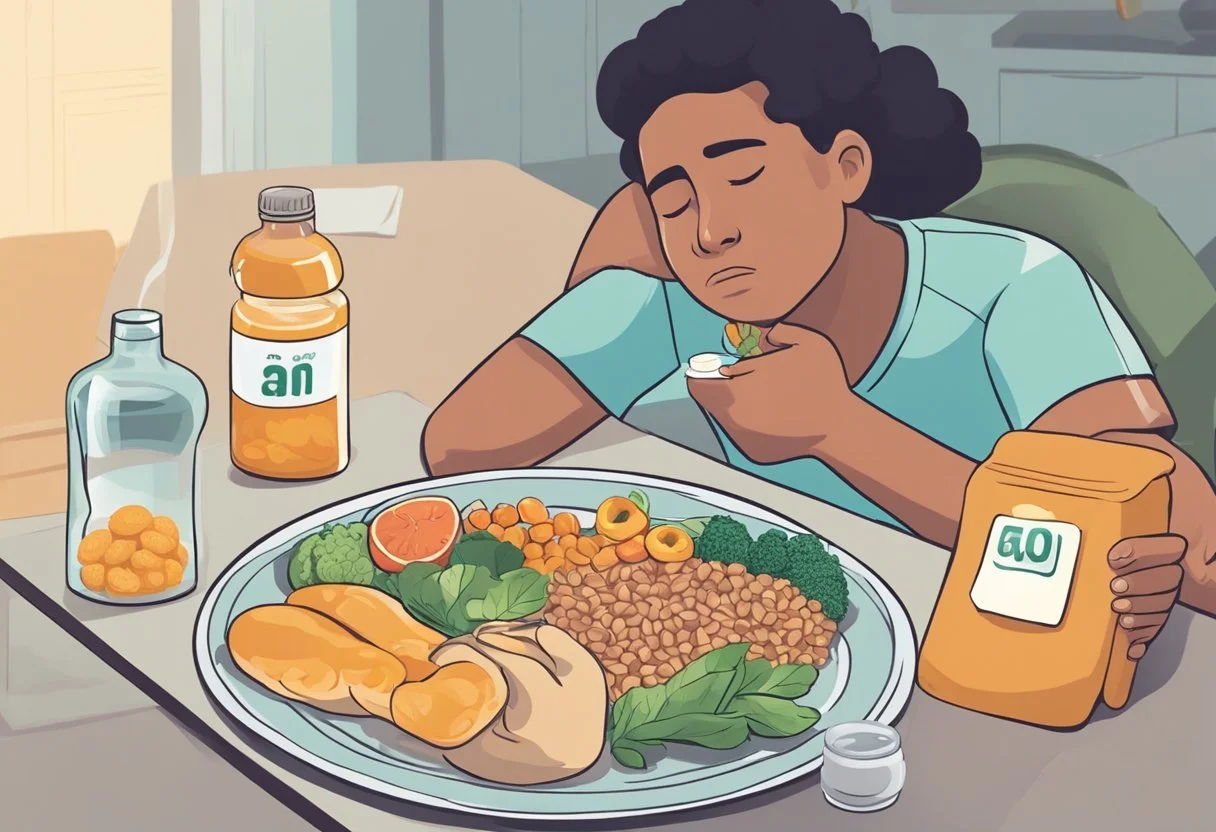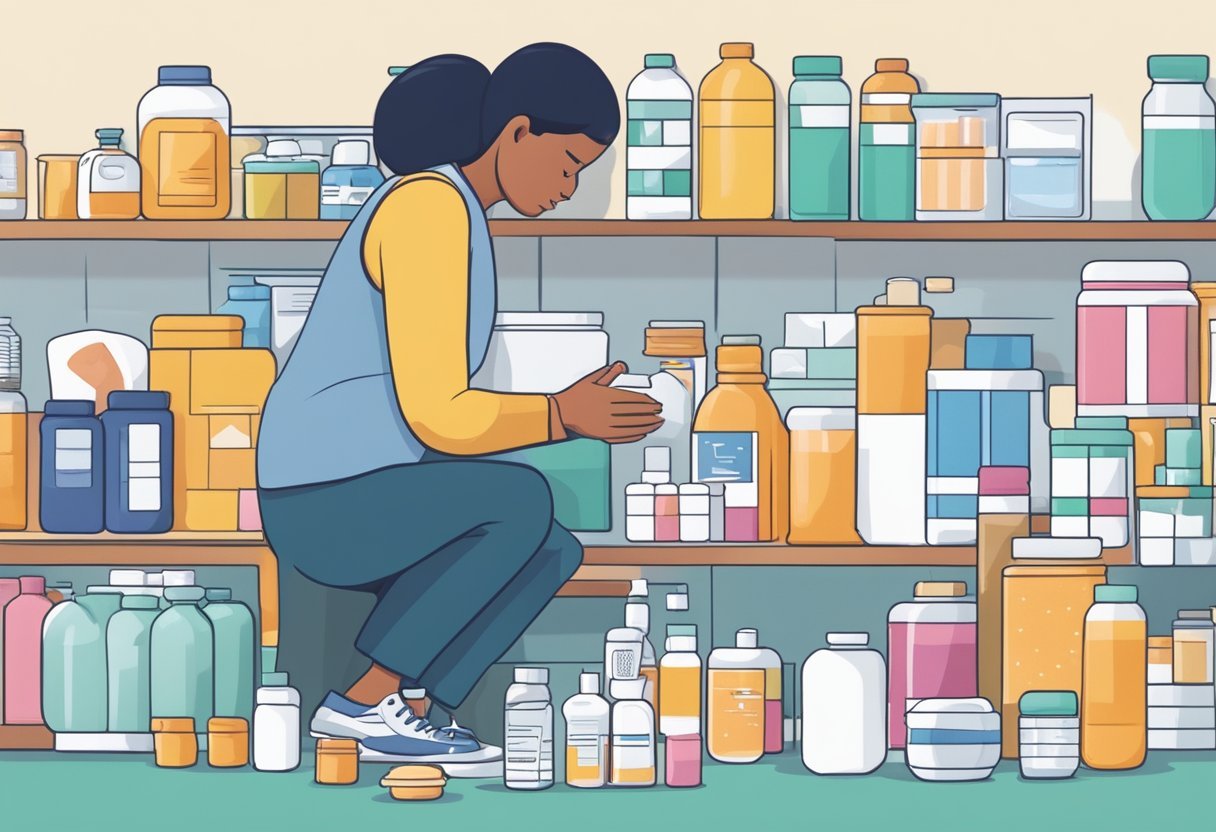Gas and Bloating
Symptoms, Causes, and Home Remedies
Discover > Health Conditions > Gas and Bloating: Symptoms, Causes, Home Remedies Explained
Gas and bloating are common digestive issues that many people experience from time to time. These symptoms can be uncomfortable and lead to feelings of self-consciousness, but understanding their causes and how to manage them can significantly improve one's quality of life. This article will explore the symptoms, causes, and home remedies for gas and bloating, providing valuable insights to help conquer these unwelcome digestive problems.
The symptoms of gas and bloating can range from mild discomfort to severe pain. They include a feeling of fullness or tightness in the abdomen, excessive burping or flatulence, and abdominal pain or discomfort. Identifying the causes behind these symptoms is essential for finding the most effective home remedies for relief. Factors that may contribute to gas and bloating include certain foods, overeating, swallowing air, and underlying medical conditions.
Simple home remedies can often help reduce gas and bloating, making it easier to manage these symptoms. Some of these remedies include dietary modifications, relaxation techniques, and gentle exercises. In-depth understanding of symptoms and causes will empower individuals to take control of their digestive health, and find suitable solutions to alleviate gas and bloating.
Symptoms of Gas and Bloating
Gas and bloating are common digestive issues experienced by people of all ages. The symptoms of gas and bloating can be uncomfortable and sometimes even painful. Understanding the various signs associated with these conditions can help individuals identify the issue and seek appropriate remedies.
Abdominal pain: One of the most common symptoms of gas and bloating is abdominal discomfort. This may manifest as mild cramping or sharper, localized pain. The intensity of the pain can vary from person to person, and it may change as the gas moves within the gastrointestinal tract.
Feeling full: A bloated stomach can cause a sensation of fullness, even after eating a small meal. This feeling of fullness can be accompanied by a feeling of pressure or tightness in the abdomen.
Belching and burping: When excess gas becomes trapped in the stomach, it may be released through the mouth as a burp or a belch. This is a natural and normal occurrence, but excessive belching can be a sign of gas and bloating.
Passing gas (flatulence): Expelling gas through the rectum, also known as flatus, is another common symptom and is often a source of embarrassment for many people. An increased frequency or volume of passing gas can indicate an issue with gas and bloating.
Abdominal bloating: A swollen and distended abdomen may be visible in individuals experiencing gas and bloating. This bloating may cause clothing to feel tight or uncomfortable around the waistline.
The symptoms of gas and bloating can vary from person to person, and some may only experience a few of the symptoms mentioned. Recognizing the signs can help individuals seek appropriate remedies to alleviate their discomfort, and in some cases, prevent further gas and bloating from occurring.
Understanding the Cause
In order to tackle the issue of gas and bloating effectively, it is essential to understand the root causes behind it. The majority of cases are caused by the natural process of digestion. As your body breaks down food, gases such as carbon dioxide, hydrogen, and methane are produced. These gases can accumulate in your gastrointestinal (GI) tract, leading to feelings of bloating and discomfort.
Some common causes for excess gas and bloating include:
Dietary habits: Consumptions of certain foods, such as beans, lentils (how long do lentils last?), cabbage, and carbonated drinks, can lead to increased intestinal gas production. Additionally, consuming large quantities of food in a short period can result in swallowing air which contributes to gas.
Constipation: Slow bowel movements can cause a buildup of gas and stool, increasing feelings of bloating and discomfort.
Diarrhea: Loose stools can cause intestinal inflammation and changes in your gut bacteria, leading to gas production.
Infections: Bacterial, viral, and parasitic infections in the GI tract can cause inflammation and increased gas production.
Irritable Bowel Syndrome (IBS): A common disorder affecting the colon, IBS can cause symptoms such as constipation, diarrhea, and gas. It is often related to an imbalance in gut bacteria or a highly sensitive colon.
Inflammatory Bowel Disease (IBD): Conditions such as Crohn's disease and ulcerative colitis cause chronic inflammation in the GI tract, which can lead to gas and bloating.
Celiac Disease: This autoimmune disorder causes damage to the small intestine when gluten is ingested. The inflammation caused by this condition can lead to gas and bloating.
In some cases, gas and bloating can indicate an underlying condition that requires medical attention. Conditions such as liver disease or even cancer might cause bloating and swelling of the abdomen. It is crucial to consult with a physician if you experience persistent gas and bloating accompanied by additional symptoms, such as unexplained weight loss, severe abdominal pain, fever, or blood in your stool.
Proper digestion highly depends on gut microflora, which help break down complex carbohydrates and ferment undigested food. When this process is disrupted by factors like stress, poor diet, medications, or underlying health issues, gastrointestinal symptoms such as gas and bloating may occur. Addressing the root causes and making appropriate lifestyle modifications can significantly improve your symptoms and overall gut health.
Dietary Factors
A variety of dietary factors can contribute to gas and bloating. Understanding these factors can help individuals identify potential triggers and make necessary adjustments to their diet. The following paragraphs discuss common dietary causes of gas and bloating, as well as some possible home remedies.
One major cause of gas production is the consumption of high-fiber foods. While fiber is essential for maintaining a healthy digestive system, it can also produce gas as it is broken down by bacteria in the gut. Common high-fiber foods include fruits, vegetables, beans, peas, and whole grains like wheat. To minimize gas production, it is recommended to gradually increase fiber intake and consider incorporating fiber supplements to maintain regularity without excessive gas.
Beans and vegetables are well-known for causing gas due to their high content of indigestible carbohydrates. One of these carbohydrates is raffinose, which causes gas when broken down in the colon. A possible remedy for this issue is using over-the-counter enzyme products like Beano that contain the enzyme alpha-galactosidase, which helps digest raffinose.
Certain sugars in the diet can be challenging for the digestive system to break down, leading to gas and bloating. Common culprits include lactose, fructose, and sugar alcohols like sorbitol, mannitol, and xylitol. Lactose is a sugar found in dairy products, and people with lactose intolerance may experience gas and bloating after consuming dairy. Fructose is a sugar found in many fruits, vegetables, and processed foods, and some individuals may have trouble absorbing this sugar, leading to gas. Sugar alcohols are commonly found in sugar-free products and can cause gastrointestinal symptoms. Reducing the consumption of foods containing these sugars can help alleviate gas and bloating.
Gluten, a protein found in wheat, barley (how long does barley last?), and rye, can cause gastrointestinal issues, including gas and bloating, for individuals with celiac disease or non-celiac gluten sensitivity. A gluten-free diet may help alleviate these symptoms.
Swallowing air while eating or drinking can also contribute to gas production. Carbonated beverages, eating too quickly, chewing gum, or using a straw can all increase the amount of air swallowed. Reducing these habits may help alleviate gas and bloating.
To identify specific dietary factors that may be causing gas and bloating, it can be helpful to keep a food diary. Tracking daily food intake and noting any symptoms after eating can help pinpoint triggers to address.
Lastly, some popular home remedies for gas and bloating include the use of peppermint and activated charcoal. Peppermint oil (how long does peppermint oil last?) capsules have been found to help ease gas-related discomfort and can be taken as a supplement. Activated charcoal, although not scientifically proven to reduce gas, is believed to absorb excess gas in the stomach and intestines.
In conclusion, dietary factors play a significant role in the occurrence of gas and bloating, and understanding these factors can help individuals make informed choices about their diet to alleviate these symptoms.
Behavioural Factors
Chewing gum and drinking through a straw can cause an individual to swallow more air, which can lead to bloating and gas buildup in the colon. Moreover, poor-fitting dentures can also make it difficult to chew food properly, causing the individual to swallow excess air.
Anxiety can cause or exacerbate bloating and gas as well. When people become anxious, they often swallow more air, leading to increased gas. It's essential to find healthy ways to manage anxiety and stress to reduce the risk of behavioral factors contributing to gas and bloating.
Dietary changes can affect the balance of good bacteria in the gut, causing gas and bloating. Foods such as lentils and other legumes are rich in fiber, which is beneficial for digestion, but may also lead to the production of gas. Consuming large quantities of fatty foods can slow down digestion, leading to bloating and gas buildup. Introducing new foods gradually and paying attention to food intolerance can help minimize these symptoms.
Fermentation of food in the gut is a natural process, but when an imbalance of bacteria exists, this can cause bloating and gas. Overeating or consuming large quantities of certain types of food can cause the bacteria to produce excessive amounts of gas. Carbonated drinks can introduce more gas into the gastrointestinal system, leading to burping or flatulence.
Acid reflux and vomiting can result from or cause bloating and gas; these conditions may themselves be triggered by the overconsumption of certain foods or medications. It's essential to consult a healthcare professional for appropriate medication and treatment if these symptoms persist.
In summary, recognizing and managing various behavioral factors can help alleviate gas and bloating symptoms. Making conscious adjustments to one's chewing habits, diet, and anxiety levels can contribute to a healthier digestive system.
Medical Conditions and Disorders
Several medical conditions and disorders can cause gas and bloating. Some of the most common ones include irritable bowel syndrome (IBS), gastroesophageal reflux disease (GERD), and heart failure. Alongside these conditions, certain lifestyle factors such as smoking and eating habits can contribute to the symptoms.
Irritable Bowel Syndrome (IBS) is a common disorder affecting the large intestine. It can cause a variety of symptoms, including gas, bloating, abdominal pain, and altered bowel habits. While the exact cause of IBS is still unknown, it is believed that a combination of factors such as gut sensitivity, altered gut motility, and stress may play a role. In many cases, simple lifestyle changes, such as altering one's diet and reducing stress, can alleviate the symptoms of IBS.
Gastroesophageal Reflux Disease (GERD) occurs when stomach acid frequently flows back into the esophagus, causing irritation and inflammation. This can lead to symptoms such as heartburn, nausea, and even gas. Some common risk factors for GERD include obesity, pregnancy, smoking, and certain medications. Lifestyle changes, such as adjusting one's diet and avoiding lying down after meals, can help manage GERD symptoms.
Heart Failure is a condition in which the heart cannot pump enough blood to meet the body's needs. This can lead to fluid retention in the body, causing swelling in the abdomen and bloating. Some other symptoms of heart failure include shortness of breath, fatigue, and rapid weight gain. It is essential to manage heart failure with appropriate medical treatment and lifestyle adjustments, such as a low-sodium diet and regular physical activity.
In addition to these medical conditions, certain lifestyle factors can also contribute to gas and bloating. For instance, smoking can impair the functioning of the digestive system, leading to symptoms such as gas, bloating, and indigestion. Similarly, a diet high in fatty and spicy foods or eating large meals can result in increased gas production and bloating.
In conclusion, gas and bloating can result from various medical conditions, disorders, and lifestyle factors. Identifying the underlying cause is crucial for effective treatment and symptom management. Individuals experiencing persistent or severe gas and bloating should consult their healthcare provider for proper evaluation and treatment recommendations.
Non-Pharmacological Home Remedies
There are several non-pharmacological home remedies that can help alleviate gas and bloating. These remedies focus on promoting healthy digestion and reducing gas build-up in the gastrointestinal tract.
Exercise: Engaging in regular physical activity has been shown to help stimulate the digestive process and reduce gas build-up. Incorporating activities such as walking, jogging, cycling, or swimming can help maintain proper digestion and prevent bloating.
Water: Drinking adequate amounts of water supports healthy digestion by breaking down food and facilitating the passage of waste through the digestive tract. Aim to drink at least 8-10 glasses of water every day.
Heat: Applying a warm compress or heating pad to the abdominal area can provide relief from gas pain by relaxing the surrounding muscles and stimulating the passage of gas through the GI tract.
Lifestyle changes: Adopting healthy habits like eating smaller meals more frequently, chewing food thoroughly, and avoiding swallowing air while eating, may help prevent gas and subsequent bloating.
Here are some additional remedies:
Walking: A brief walk after meals can help stimulate digestion and prevent gas build-up.
Yoga: Practicing certain yoga poses, such as the wind-relieving pose (Pavanamuktasana) or child's pose (Balasana), can help facilitate the release of trapped gas and provide relief from bloating.
Ginger: Consuming ginger as a tea or by adding it to meals may help reduce gas and bloating due to its carminative properties, which aid in the expulsion of gas from the GI tract.
Managing flatulence: Self-massage, abdominal stretches, and staying in a comfortable position can help alleviate the discomfort of flatulence.
Incorporating these non-pharmacological home remedies into daily routines may assist in managing and preventing gas and bloating, leading to improved gastrointestinal wellbeing.
Over-the-Counter Medications
Several over-the-counter medications can help alleviate gas and bloating symptoms. It is essential to choose the appropriate medication based on the underlying cause for maximum effectiveness. Some common over-the-counter options include:
1. Lactaid: Lactaid is a popular choice for those suffering from lactose intolerance. This medication contains lactase enzymes, which break down lactose in dairy products, thus preventing gas and bloating caused by undigested lactose.
2. Simethicone: Simethicone, found in products like Gas-X and Mylanta Gas, works by breaking down gas bubbles in the stomach, making it easier to pass gas and relieving bloating discomfort. It is a common and safe choice for gas relief.
3. Beano: Beano is an enzyme-based supplement that helps digest complex carbohydrates found in certain foods, such as beans, vegetables, and whole grains. By assisting with the breakdown of these foods, Beano reduces gas and bloating related to their consumption.
4. Activated Charcoal: Activated charcoal is believed to assist in trapping and eliminating gas in the digestive tract. However, scientific evidence supporting its effectiveness for gas relief is limited. Consult with a healthcare professional before trying this supplement.
5. Probiotics: Probiotic supplements contain beneficial bacteria that can help maintain a healthy balance of gut flora. This balance can, in turn, improve digestion and reduce gas-related symptoms. Examples of probiotics include Lactobacillus and Bifidobacterium strains.
It is essential to follow the recommended dosages and consult with a healthcare professional if symptoms persist. Individual results may vary, and finding the best over-the-counter medication may require some trial and error. Always consider pairing these medications with appropriate dietary adjustments to enhance their effectiveness in providing relief from gas and bloating symptoms.
Role of Medical History
A thorough medical history plays a vital role in understanding the causes and possible home remedies for gas and bloating. By examining a patient's past and present health conditions, doctors can identify potential triggers and recommend appropriate treatments.
The first step in exploring a patient's medical history is to investigate any history of gastrointestinal disorders, such as Irritable Bowel Syndrome (IBS), Inflammatory Bowel Disease (IBD), and Gastroesophageal reflux disease (GERD). These conditions can be a major cause of chronic gas and bloating. Patients should disclose any relevant information or concerns, including family history of gastrointestinal disorders, to their healthcare provider.
In addition, it is crucial to analyze a person's dietary habits and lifestyle. Certain foods are known to produce more gas than others, such as:
Beans and lentils
Cabbage, broccoli, and cauliflower
Carbonated beverages
High-fat foods
Identifying any dietary triggers can help both the patient and the healthcare provider create a plan to reduce gas and bloating. It is equally important to consider other lifestyle factors, such as stress, anxiety, or depression, as they may exacerbate gastrointestinal symptoms.
Weight gain can also contribute to bloating and distension. If a person has experienced a significant increase in weight, it is important to discuss this with their healthcare provider. Increased abdominal fat can place pressure on the gastrointestinal system, causing gas and bloating. Addressing the underlying causes of weight gain, including diet modification and increased physical activity, may help alleviate these symptoms.
In some cases, gas and bloating can be a side effect of medications or a result of underlying medical conditions. When assessing a patient's medical history, it is important to consider any prescription medications, over-the-counter drugs, and supplements they are taking. Some medications, such as opioids, nonsteroidal anti-inflammatory drugs (NSAIDs), and certain antidepressants, can cause gas and bloating as a side effect.
In conclusion, analyzing a patient's medical history is a crucial component of understanding and managing gas and bloating. By comprehensively assessing factors, such as gastrointestinal disorders, dietary habits, weight gain, and medications, healthcare providers can help patients develop appropriate strategies for relief.
#avoid chewing gum #eat slowly #chronic constipation #gas symptoms #sugar free foods #abdominal cavity







